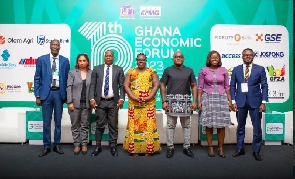 Some experts at the 2023 Ghana Economic Forum
Some experts at the 2023 Ghana Economic Forum
Experts at the 2023 Ghana Economic Forum (GEF) have advocated new approaches which put farmers at the forefront of national efforts to address food security concerns.
As producers, they said, any policy aimed at boosting production and food security must first and foremost speak to the needs and concerns of farmers if they are to yield the needed outcome; calling for a shift from the current top-down approach of policy formulation to a bottom-up regime.
The experts, during a panel discussion on the topic ‘Ensuring food sustainability and security: a call for new perspectives on the agricultural value chain systems’, came to a consensus that the current status quo – wherein there exists a gulf between policies and reality – cannot continue. They attributed the failure of numerous agricultural interventions by governments to their inability to address stakeholder concerns.
These concerns by the panel, which included Chief Executive Officer (CEO), GIRSAL Ltd. Dr. Kwesi Korboe; CEO-African Brand Warrior, Fatima Alimohamed; Head-Training, General Agricultural Workers Union of Ghana (GAWU), Emilia Ghansah; Fred Kukubor, CEO-Farmer Global; and Christiana Anim Asare, Brands Manager-Olam Agric, are not in isolation. While government has touted initiatives such as t Planting for Food and Planting for Food and Export as successes, Ghanaians continue to grapple with rising cost of food – raising questions about the impact from millions in taxpayer’s funds that government has pumped into these interventions.
For instance, food prices remain the biggest driver of inflation according to data from state statistics entity, the Ghana Statistical Service.
The panellists indicated that impacts of past and present interventions remain insignificant because there is a mismatch between what farmers really need, the timeline of supply, quality and quantity of some inputs, as well as the over-focus on inputs to the detriment of infrastructure such as storage and processing facilities.
Chief Executive Officer (CEO), GIRSAL Ltd., Dr. Kwesi Korboe said:
“To attain food sustainability and food security, the approach to agriculture policy development must change,” advocating that “we need a bottom-up approach to policy development and implementation.
“Consistently governments’ policies have failed to yield any meaningful result because the real needs of farmers are not considered; and even when a policy in theory meets requirements, poor implementation makes it ineffective,” he added.
He emphasised that in an era of technological advancement and globalisation, land preparation has been made easier; but local farmers are still struggling to address that challenge because policies have failed to procure enough agricultural machinery to foster mechanised farming.
He said there are only a few functional irrigation facilities around the country, making it impossible for farmers to cultivate food all-year round, while logistical input-constraints and poor road networks in farming areas continue to affect production and transportation of food.
For her part, Fatima Alimohamed, CEO-African Brand Warrior, called for diversification of the agricultural economy from a cash crop perspective to consumables. “Our inability to attain food security can also be linked to our dependence on cocoa. We keep focusing so much on cocoa, and now China is producing cocoa. The EU is about to implement new policies that will make it difficult to export some of our cocoa because of standards, but we have not supported other food crops which have great potential – like even plantain and banana that has enormous use, and the by-products are also of high value.”
She further stressed that to attain food sustainability and security, government must back existing policies with action and support small- and medium-scale enterprises (SMEs) that are into agro-processing and enable them to meet domestic demand and serve foreign markets.
Similarly, Head of Training, General Agricultural Workers Union of Ghana, Ms. Ghansah, highlighted what she described as four priorities that can transform the agricultural value chain’s fortunes and ensure food security: availability of farm produce; accessibility of funding for farmers and access to different classes of markets across the country; affordability of food; and connectivity facilitated by good infrastructure.
Unfortunately, she said, all these conditions have not been met and are currently far from attainment, considering the rate of investment and state of policy implementation in the sector.
Touching on the price of food, she said: “Anytime I think about the post-harvest loss of farmers, my heart is pained. There are so many losses in the value chain, which is a major factor for the increase in food prices. Every loss and impediment in the value chain between the farmgate and the market will be added to the produce before a mark-up cost. This translates into higher prices on the market, reducing the purchasing power of consumers”.
Recommendations
The panellists demanded that policymakers engage farmers earnestly and understand their needs and expectations before putting together policies in a manner that is devoid of partisan politics which seek to dump some inputs, especially fertilier, on farmers without even educating them on how best to use them.
The panel added that the issue of access to funding remains an albatross around the neck of farmers, and government must engage lenders on how to make funds available to farmers at a cheaper rate.
12th GEF
The forum’s 12th edition was set against a backdrop of the toughest macroeconomic period in over a decade; the US$3billion Extended Credit Facility (ECF) from the International Monetary Fund (IMF); and ensuing actions such as the Domestic Debt Exchange Programme (DDEP).
Themed ‘Build back better: IMF support, strategies to build a sustainable economy and dynamic business environment’, GEF 2023 was organised by the B&FT in partnership with KPMG. It had Stanbic Bank, Fidelity Bank, Olam Agri, Ghana Free Zones Authority, Republic Bank and Ghana Stock Exchange as some of its sponsors. Other sponsors included Jospong Group of Companies, Access Bank, Ghana Revenue Authority and GLICO – with Asaase Radio, YMF, Happy FM and Citi FM as media partners.